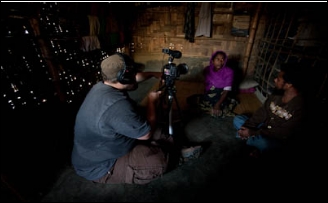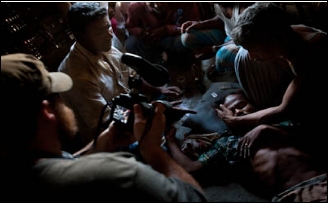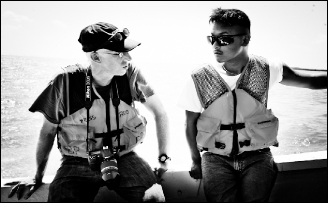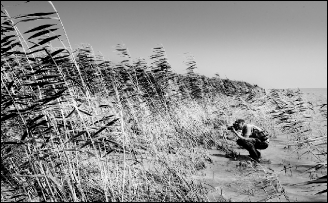 | ||||
| |
Due to the overwhelming number of emails we receive every week from students and amateur photographers all around the world, we have designed a workshop abroad program. The focus of this program is to not only teach visual story telling but give students a chance to fully experience a career that is often misunderstood. While media and films have glamorized the lives of photojournalists and foreign correspondents, the reality is that this is one of the world's most demanding and difficult jobs, both physically and mentally. We have designed Zoriah's workshops to give young photographers an opportunity to experience the true nature of international photojournalism and documentary photography. No other workshop or seminar gives students the ability to work one on one with a professional photojournalist in a real world environment. Each student will have full access to Zoriah through the duration of the workshop, giving them the opportunity to take advantage of his work experience, teachings, methodologies and industry contacts. . Due to the intimate nature of these workshops and the real world working environment, each student can expect to learn and experience much more than they would during one year in a standard university photojournalism program. Each workshop is either six or ten days long and set in a location that is both of interest to the student and rich in culture with a wealth of photographic and documentary subject matter. During the program, each student will be expected to produce at least one photo essay within the same deadline and parameters of a working assignment for a publication or photo agency. Zoriah will also produce a photo essay during the trip, which will give the students the ability to not only produce their own work and learn on their own, but to be able to observe the way Zoriah works and ask questions along the way. Because we believe the life of a photojournalist is usually a solitary one, each student will be expected to spend two hours a day shooting on their own, with a review session of that work every evening. When not shooting, the students will work closely with Zoriah on editing their work and of course be able to see the process he takes in editing his own work. Zoriah will stay in the same hotel, eat meals, and travel with his students as if they were a team of journalists working in the field together. This is a rare opportunity to actually work side by side on a daily basis with a full time, professional photojournalist.
Requirements and Application Process This program is designed for professional photographers and committed photography and journalism students who are interested in pursuing a career in journalism, photography or visual story telling. Photography hobbyists are also welcome. Students must be in good physical and emotional condition and must be ready for a very challenging experience. All applicants must have a basic proficiency in digital photography as well as editing software. Interested photographers must submit a portfolio of no more than 20 images and fill out an application. Applications and images may be sent by mail but digital transmissions are preferred. All application material must be submitted at least 30 days before the start of the workshop. Hard copy submissions will not be returned. Group workshops are available on request and are currently limited to five photographers in order to insure that each student gets the attention that the program is designed to provide. Students are strongly encouraged to consider one on one workshops which give an individual student the opportunity to work with Zoriah one on one for the durations of the workshop.
What to Bring Students are expected to provide their own SLR style digital camera and a laptop with editing software such as Adobe Photoshop or Lightroom, just as if they were on an editorial assignment. Each workshop will have some additional requirements such as appropriate clothing, medicines etc. A full packing list will be provided to students before their departure.
War Photography Although Zoriah has spent a fair amount of his professional career as a war photographer, we do not think bringing students into a war zone is in any way appropriate (the only exception we will make to this rule is if the photographer has already been working professionally for a number of years and can provide supporting documents and a work history.) In some cases a workshop may be held in an area that is recovering from conflict, such as Lebanon. There are many skills a photographer needs to possess before ever going into a hostile environment and the decision to cover conflict should not be entered into lightly. Zoriah will be more than happy to discuss his experiences with students and provide them with resources to research and explore this type of journalism.
Portfolio Review Session Each workshop begins with a portfolio review session. Students are asked to bring a portfolio of no more than 20 images (preferably in digital format on their laptops,) which will be reviewed and critiqued on the first day of the workshop. This gives me the opportunity to see where a student stands in his or her development and what skills should be focused on during the workshop.
Accommodations Accommodations will vary depending on the location but students should be prepared for minimal luxuries. Part of working as a photojournalist is being able to adapt to difficult situations. At times workshop students may spend at least a portion of their time sleeping on uncomfortable beds and showering in cold water. Certain workshops are held in locations where they may stay with a local family for a day or two or even an orphanage or refugee camp.
Costs Costs vary depending on the location of the workshop, accommodations, available meals and how much travel will be done during the workshop. Students are responsible for their own expenses during the workshop and will be given a list of what to expect for his or her specific program. In most developing countries students get by spending very little.
Dates Workshops are generally held during University holidays such as Winter Break, Spring Break or during the summer. As long as students book far enough in advance the dates quite are flexible.
Workshop Subjects This program covers a vast array of subjects including: Preparing for and researching a project and destination. What to pack and what not to pack. How to avoid common pitfalls like lost data, a broken camera or lens, computer viruses, travel illnesses, dangers and distractions while in the field etc. Health and nutrition in difficult living situations and what to do if you get sick or injured. Photographing under adverse conditions. Gaining your subjects trust and photographic ethics. Night and low light photography. Working without a flash or tripod. The digital darkroom, editing and workflow in Adobe Photoshop and Lightroom. Tips and tricks for “saving” a photograph or putting the finishing touches on a “perfect” photograph. Digital dodging, burning, contrast, hue, saturation, cloning (and when not to,) cropping etc. Color and black and white: when to use each, how they sell, how to think in one medium or the other or both. JPEG vs. RAW file formats and how to work with each and convert. Mac vs. Pc. Choosing editing, captioning, ftp and slideshow programs. Camera selection. Lens selection. Memory card selection. Accessory selection. Canon vs. Nikon vs everyone else. Buying new vs. buying used and how to get the best deals. How to read manuals and get the most out of what you own. How to work with your camera and use its many functions. Camera and lens field care. Uploading images to agencies while in the field. Preparing an image for transmission to agencies and editors. Captioning images and the five W's (Who, What, When, Where and Why.) Working with editors, deadlines, assignments, freelance projects etc. Building and presenting a story online/digital lightboxes and personal websites. The nuisances of working with editorial clients and how to limit them. Building a contract for freelance work and what to look for (or look out for) when signing a contract with an agency or publication. Copyright information and how to use it in the real world. Preparing for the future and impending changes in the industry.
Available Workshops Workshops and their locations are usually tailored to the interests of a specific student or group of students. A few ideas and past workshops are included below for reference, actual workshops will be tailored to the needs and desires of each individual participant:
- Cambodia: AIDS Orphans - Live in an orphanage and document the lives of one or more children - Vietnam: Comparing urban and rural poverty. Students spend half the workshop photographing in Saigon and the other half in Chau Doc or another small village - Kenya: Fishing Lake Victoria - Document the lives of fishermen and their families from small villages on the banks of Lake Victoria - Pakistan and Kashmir: Working in Extreme Conditions. This workshop is designed to give higher-level students a chance to experience work under adverse conditions - India: Beggars life. Spend one week documenting the life of homeless or or what locals call an "untouchable" man or woman - China: Modernizing an Ancient Culture. Document how modernization and progress effect an ancient culture in the amazing city of Shanghai - Uganda. Document storeis for local NGO's, covering subject matter such as life in the slums, child drug addicts and child prostitution - Nicaragua: Shanty Towns. Documenting life in extreme poverty - Lebanon: Palestinian Refugees. Spend time photographing the lives of Palestinian refugees living in camps around the country - Cuba: This Street Photography workshop focuses on documenting the lives of workers and everyday Cubans in the streets of the vibrant and highly photogenic city of Havana - Philippines: Poverty's Environmental Impact: Work in urban slums to show the impact of poverty on the ocean and environment - Turkey: The New Face of The Refugee Crisis. Live in an urban jungle pupulated by refugees from around the world while documenting their lives -Japan: Technology and The Modern World. Explore the role of technology in our lives in one of the most advanced cities on planet earth. *Japan workshops have higher tuitions and higher living costs - Laos: Shoestring Travel. Students travel through Laos and produce a story geared to budget minded travelers and backpackers - Brazil: Amazonian Deforestation. Work in the Amazon Basin documenting the environmental impact of clear cutting - Honduras: Travel and Underwater Photography. Students produce a travel story with two to five days being underwater photography instruction by Zoriah and the master divers at Ocean Connections PADI Dive Shop. *students without a scuba diving license will complete a three day licensing course durning the beginning of the workshop - Morocco: Travel Photography. Travel from Cassablanca to Marakesh and produce a travel related photo series - Indonesia: Child Drug Addicts. Photograph the lives and struggles of children addicted to inhalants - Israel and Palestine: Compare and contrast life in Jerusalem and life in the West Bank city of Ramallah - Mexico: Fossil Fuel Impact. Document car culture and its effects on the environment in one of the worlds most polluted cites, Mexico City - New York City: Marketing, Connections and Where to Start. This 5 day workshop is designed for students who already have an established portfolio. Students will work on refining their portfolio, building picture stories and marketing them to editors and agencies. Students will meet with industry professionals, editors and other professional photographers for portfolio reviews and guidance sessions. *New York City workshops have higher living costs
Hometown Workshop Program Can't afford the time or travel expenses for a workshop abroad, let us send Zoriah to you? The hometown workshop program was designed to offer an alternative to the workshop abroad program in which Zoriah will fly to your hometown to work you one-on-one. Just like the workshop abroad program, the hometown workshop will be tailored to the needs and interests of each individual student. The workshop begins with a portfolio review session then the planning of a photographic assignment to be completed in your own comunity. Zoriah will work with you,completing the same project by your side, allowing you to watch the way he works and be guided along the way. A portion of each day will be devoted to the editing process, working together on preparing a story as if it were a real editorial assignment for a newspaper or magazine.
Please email for more information on any of these programs or if you would like to have a program tailored to you or your groups needs and interests
Workshop Tuition 2013 5 Day One-on-One Workshop - $5500 7 Day One-on-One Workshop - $6500 10 Day One-on-One Workshop - $8500
European Travel Photography Workshop Tuition 4 Day Liveaboard One-on-One Workshop - $4000*
Hometown Workshop Tuition 4 Day Hometown One-on-One Workshop - $3500*
*Workshops begin the first full day in the field *Travel and expenses are in addition to the tuition fee and vary depending on the workshop *Hometown workshops require the student to cover Zoriah's travel and expenses on top of the tuition fee *Liveaboard travel photography workshops in Europe include room and board on Zoriah's ship
We believe firmly in teaching students how to think for themselves and learn on their own once the workshop has come to a close. We want to give each student the tools they need to find answers and solutions to their problems when they arise for the rest of their lives. Photojournalism is about knowledge, education, exploration and giving back to the world. Too many educational institutions focus on filling students heads with facts while forgetting to teach them how to learn! It is our goal to inspire my students to be the best that they possibly can and never, ever stop learning and growing and teaching themselves new things *For group workshops we reserve the right to cancel the workshop if we do not receive enough students/participants enrolling to make the workshop viable (If the workshop is cancelled, full refunds will be issued minus any costs accrued up to that point, including PayPal fees. | |
| |
| |
|
| ||
This ten day, intensive, one-on-one workshop brought film maker James Rhodes to Bangladesh to begin an in-depth project. James worked for many years in the entertainment industry and worked on several Oscar winning films including The Lord of The Rings and Crash before switching to documentary work. The workshop was focused on capturing the plight and lives of Rohingya refugees, a Muslim ethnic group from western Burma. Thousands of Rohingya have fled Burma and ended up in refugee camps in neighboring Bangladesh. They have found themselves trapped in an impossible situation, unable to return home to Burma for fear of violence or death but unable to stay and work legally in Bangladesh. James wanted to document the lives of the Rohingya people in hopes of bringing light to their stories, which often go unheard. The workshop began in Dhaka where Zoriah led James through the essentials of planning a story, making connections, dealing with government officials and logistics involved in shooting a difficult project in a remote location. Zoriah used his extensive experience with such issues to guide James in the process of not only planning a story but completely following through with it. The workshop then moved to rural Bangladesh near the Burmese border. Here James was guided through subjects such as photographing people in difficult situations, working in refugee camps, visual storytelling and documentation and numerous other subjects. A translator needed to be hired in order to translate interviews for the video portion of James' documentary as well as a local driver. Each day new challenges were faced and overcome or at least worked around. A major part of photojournalism is being able to adapt to constantly changing situations and a great deal of the workshop content revolved around how to do this in each different situation. James came away from the workshop with not only an excellent set of documentary images showing the plight of the Rohingya refugees but also enough video documentation to begin work on a feature length documentary on the subject. Going from someone who had not been outside of the borders of the United States to someone who has completed a large amount of documentary work on a difficult subject in only a matter of weeks was a true accomplishment and something James can be very proud of. | |
| |
| |
|
| ||
After the worst oil spill in the history of the United States, lives of humans and animals in the Gulf of Mexico were changed forever. Yet few photographers and photojournalists were there to document this human and environmental disaster. This seven day workshopbrought Sage Lewis to Louisiana to embark on the difficult task of documenting a catastrophe that was difficult togain access to. Zoriah coached Sage in everything that i required of a photographer when documenting in these difficult situations. From embarking on a story with few leads and very little solid information to finishing one week later with exceptional photo stories showing the severity of this spill, Zoriah and Sage produced images that have since been used around the world to illustrate this disaster. Zoriah tought sage how to work with military and governmental officials in order to gain access to an oil spill that was off limits to many. They worked with the US Coast Guard and the Department of Fish and Wildlife on a daily basis, visiting locations such as a bird rescue and rehabilitation center, oil soaked marshlands and seas, local villages and peoples affected by the spill, releif operations, clean-up operations and environmental research being conducted by scientists. Although this workshop proved to be more exhuasting than others, they were able to cover a massive amount of ground and subject matter in one, producing photo essays that showed sides to this disaster seen and captured by very few, including large publications and media outlets. | |
"I just completed my week-long workshop with Zoriah exploring the Gulf Coast Oil Spill. To give you a point of reference, I’m a father, husband, small business owner and (once upon a time) a cellist - that’s what I went to college for. I’m 38. For the last several years I have been getting progressively more interested in my personal amateur photography. I have been taking pictures, off and on, since high school. My kid, Indiana, is currently 5. His presence in my life has made me want to be a better photographer. I feel that these years are very special for all of us in our family. They will happen once and then be gone. I would like to capture them to the best of my ability. You should also know that I have had the good fortune of studying with some great teachers, in my music pursuits. I’ve studied with principal cellists from major orchestras. I’ve studied at some of the premier music academies. And I’ve also studied with one of the greatest cellists of our time... I know what a good teacher is. I tell you all this because I believe my one week workshop with Zoriah will probably go down as one of the greatest learning moments in my life. I believe the depth and quality of my life has grown significantly by having this week experience with Zoriah. When you participate in Zoriah’s photography workshop you are getting a complete immersion program in learning all the ins and outs of photojournalism. Zoriah would often tell me that each workshop he has done is very different from the next. I’m quite sure that’s true because Zoriah takes such great concern to understand your goals for the workshop. He is incredibly sensitive in making sure you get as much as you possibly can. On top of being one of the great photojournalists he is also a great teacher. He would often ask me if I had any questions or how I felt the workshop was going. He wanted to make sure I was getting exactly what I wanted out of it. He was very patient and thoughtful of my particular learning style. The effort he puts into these workshops is Herculean. In my case, he drove a minimum of 4 hours every day getting us in and out of where all the action was. We had to do this because this disaster was happening in several hard-to-get-to destinations. Zoriah put in a minimum of 12 hour days... with the last day requiring us to get up at 3:00am to catch a boat to photograph oil soaked marshlands for 7 hours and then driving 2 hours back to our hotel.. (I should say, he is also always pleasant to be around. He is kind and courteous every single minute.) When you participate in Zoriah’s photography workshop you are getting a one-on-one, highly customized experience. He can, and has, worked with professional photographers as well as working with amateurs like me. I was concerned I might be getting in over my head. But he always made me feel comfortable. Off the top of my head, some of the bigger things I got from the workshop were: Gaining access to the military and officials in charge of a disaster. Where and when to look for the best potential pictures. How to go about getting a great picture. Great editing techniques and secrets of the photojournalism trade. A huge resource of videos and written material. In my workshop I got to see very clearly reporters and journalists not doing the process well... and how a serious, hardened professional like Zoriah did things right. (It was literally shocking to see the mistakes other professionals were making as Zoriah effortlessly (or so it looked on the outside) glided through gaining access to the best stories and pictures to be had at my particular workshop. After this workshop I feel like I have the tools to create pictures that look professional. And I also know how to chase down a story. I’m already planning my next photojournalism assignment. Zoriah also has a lot of experience and information on how to make this a career. This workshop would definitely be highly valuable for a person looking to get into the photojournalism profession. That didn’t happen to be the goal for my case. If you want your pictures, and your photographic storytelling, to get significantly better incredibly quickly, please consider Zoriah’s photography workshop. I promise you will be so thankful you did. If you want to talk to me more about my experiences and thoughts on the workshop feel free to email me at: sage@sagerock.com. I’d love to talk to you about it. Thanks Zoriah... for an experience of a lifetime!" Sage Lewis | |
| |
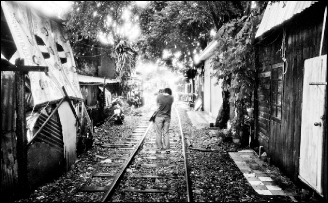 | 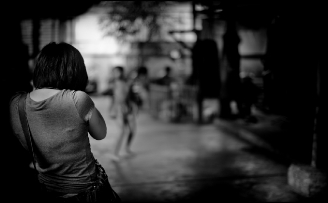 | ||
|
| ||
Adelaide Lin received her MA in Visual Communications and later went on to study photography at SPEOS in Paris. With a deep understanding of art and the visual medium, Adelaide wanted to learn about photographing people in intimate and difficult situations. She knew that conflict photography and highly emotional subject matter were not for her, but wanted to learn how to approach stories with social significance on her own, so that she could pursue documentary photography for NGO's. Becauase of this we worked hard to build a workshop for Adelaide that would provide her with documentary subject matter yet also have an uplifting and positive message and outcome. Adelaide's ten day intensive workshop focused on the lives and struggles of children living in the slums of Bangkok who study Mai Thai (kickboxing) in order to live a life away from gangs and drugs and with the potential for wealth and fame. The story exlored the living conditions in the slums, the childrens lives on the streets, the home lives of slum children, the kickboxing programs for slum children and the ex-fighters who devote their time to keeping the kids in the rings and off the streets. Subjects covered during the workshop included: Gaining access to difficult subject matter, photographing people up close and personal, visual storytelling, staying safe photographing in potentially dangerous areas, producing photo stories for NGO's, building a photojournalism portfolio, editing (including archive management, building presets, advanced editing techniques such as black and white editing with HSL sliders, exporting for print/web etc.) technical skills in photography specific to photojournalism (how to capture the decisive moment, metering, shooting in low light etc.) | |
| |
| |
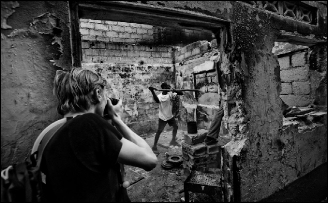 | 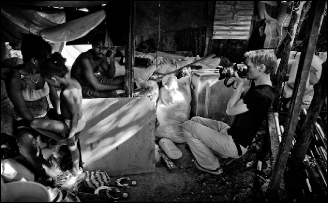 | ||
|
| ||
This five day workshop was focused solely on covering the aftermath of a major natural disaster, the Haitian Earthquake. Kasper Nybo, a workshop student with a background in graphic work and close family connections to the international aid community, sought the tools necessary to not only work in an extremely difficult situation but also produce high quality images geared for use by humanitarian aid organizations and NGO's. Photographing the aftermath of disasters requires both skill and compassion. The ability to relate to your subjects, at least to some degree is essential. For that reason as well as reasons of safety (even seemingly solid and still standing structures are incredibly dangerous after earthquakes due to aftershocks and compromised structural integrity,) Zoriah and Kasper slept in tents. The stayed on the property of Hospice St Joseph which was used in the immediate aftermath of the earthquake as a shelter for the displaced and at the time of the workshop was being used as an outdoor medical clinic and school as well as housing half a dozen locals in make-shift, outdoor quarters. Along with their other projects Zoriah and Kasper photographed several stories for Hospice St Joseph to be used for raising awareness of those they care for as well as fundraising to help rebuild their main building Kasper was interested in producing a story on the public health situation in Haiti, so the workshops focus was geared towards this. Good visual storytelling involves putting together many different yet related subjects to form a story that is dynamic, interesting for the viewer and gives an accurate portrayal of the situation. To do this the public health story was told on many levels. On the streets they captured images of poor sanitation, lack of adequate food and drinking water as well as stray animals which may carry disease. In the refugee camps they documented the terrible conditions people live in, the lack of mosquito nets which pose further risk of disease and many other subjects. In the hospitals they followed foreign medical staff providing aid as well as local doctors. They shot in the morgue, the neonatal ward, intake/triage, people injured in rubble and those suffering from disease. Each of their stories were donated to the International Medical Corps for use in fundraising and Zoriah's images have also been donated to and are being used by Medicins Sans Frontiers (Doctors Without Borders.) In addition to the general public health situation, an intimate look into the life and struggles of the Haitian people after the earthquake was a necessary piece to the story. Zoriah and Kasper spent two days photographing a young girl whose mother had been killed in the quake and was now being cared for by a young member of her extended family. Living in terrible conditions with a lack of proper sanitation, access to clean water and proper food, the family struggles, especially with a new member. | |
| |
| |
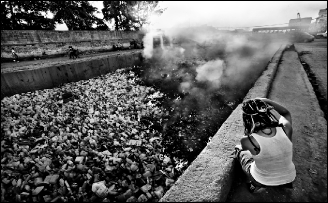 | 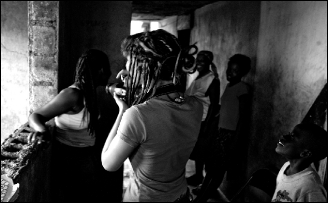 | ||
|
| ||
This ten day intensive workshop brought photography student Anais Dodson to Haiti. The workshop was designed to fit Anais' needs with a focus on photographing people, documentary photography, editing and the marketing and business side of photojournalism. The workshop began in Port au Prince where the first day was spent as if setting up for an editorial assignment: making local contacts, researching possible stories, setting up a local mobile phone and working on the logistics involved in shooting an assignment abroad. The second day was spent narrowing down story ideas and getting Anais comfortable with approaching and photographing perfect strangers. The workshop then moved into the process of visual storytelling and how to begin shooting a photographic story. Zoriah and Anais had several story ideas at this point and went to a local prison to try to begin shooting a story on the large number of homeless, juvenile detainees in an overcrowded prison system. They later decided that day that the bureaucracy of acquiring government permission to shoot in the prisons would be too difficult to deal with and decided to pursue another story idea they had come up with. Since Anais was not only interested in capturing good images and good stories but also making a living from doing so, they decided that capturing a multidimensional story in Haiti would be the most interesting and also the most marketable. Zoriah and Anais decided to focus the workshop around a story on the social and environmental impact of charcoal use in Haiti. Only two percent of Haiti's trees remain, after years of cutting to supply the nation with charcoal. The solution is not easy as Haiti is the poorest country in the Western Hemisphere and much of its population lives in dire poverty without resources to cook with anything other than charcoal. to make matters worse, the deforested areas give way to soil erosion and disasters such as massive mudslides which plunge the country and its population into an even deeper state of poverty. To examine this story in-depth, Zoriah and Anais photographed business such as restaurants and dry cleaners which rely on coal for energy. They also visited City Soleil, the largest slum in Haiti where residents rely on coal to cook their food. They photographed the docks where coal is unloaded from boats by laborers as well as a rural area where they photographed the process of charcoal being made. The final four days of the workshop were spent trekking into an extremely remote area to visit the last remaining forested area in Haiti, which is quickly being torn down to produce more charcoal. They photographed both those who rely on cutting down trees to survive and those who try to prevent them and spread awareness about the environmental impact of destroying the forest. All of these elements came together to make a wonderful feature story that both Zoriah and Anais were proud of. | |
| |
| |
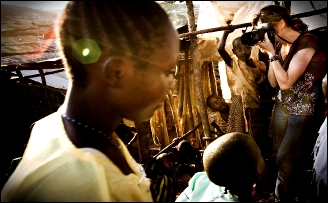 | 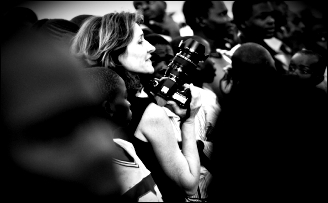 | ||
|
| ||
| |
| |
| |
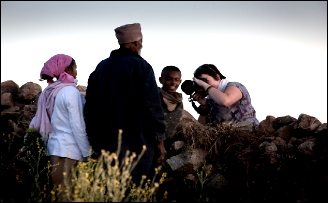 | 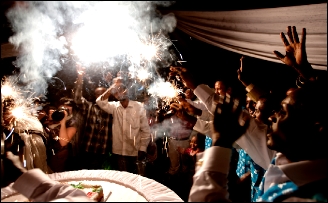 | ||
|
| ||
Xilia Faye, a professional photographer for five years, joined Zoriah in Ethiopia for a ten day intensive photojournalism workshop experience. Xilia was s interested in exploring the world of photojournalism and documentary photography while also experiencing a new culture. The workshop was set up to focus both on shooting and editing. Xilia was interested in both social documentary photography focusing on the lives of the Ethiopian people as well as environmental photography so Zoriah tailored the workshop to her needs and goals. The workshop began in Addis Ababa, the bustling capital city of Ethiopia. They hired a local driver and translator and set out to visit some of the more impoverished areas of the city. They spent time with several families in their homes in slum villages as well as on the streets photographing the residents daily activities. They also visited the main dumpsite outside of the city where they documented children working in the terrible conditions in order to survive. Zoriah and Xilia also spent some time in a small neighborhood which was slated for demolition in order for the government to offer the land up to commercial developers. There they captured residents in the few weeks before they wold be displaced from what many of them had called home for their entire lives. The second half of the workshop was spent trekking to and photographing in the remote but incredibly unique and beautiful landscape of the Danakil Depression. Rarely photographed do to its remote location and problems with armed conflicts and kidnappings near the Eritrean border, the Danakil Depression looks like something out of a science fiction movie and produces stunning photographs. The salt flats that also find their home in the region provided Zoriah and Xilia with a photographic look into the lives of the salt transporter who walk four days straight in camel processions to bring salt to outlying villages. Both Zoriah and Xilia shot several thousand images each covering a huge variety of subject matter from the lives and struggles of impoverished Ethiopians to the natural wonders of a incredibly divers country. | |
| |
| |
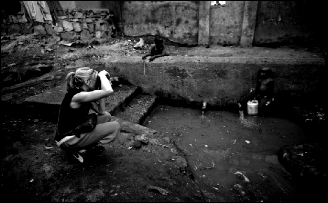 | 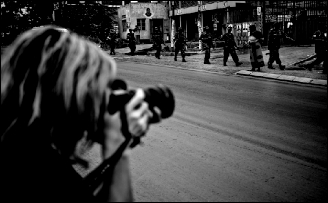 | ||
|
| ||
| |
"I recently took a workshop with Zoriah in Uganda. My specific interests were in women’s and children’s issues and he did an excellent job of tailoring the workshop to compliment those interests. We spent 10 days making contacts, following different leads, and capturing the heart of several different issues that are prominent here in Kampala, Uganda. He really shed some light on the world of international photojournalism. Not only did he do an excellent job of teaching me the key aspects of visual storytelling, he also showed me the reality of life as photojournalist; a career that from the outside would appear to be mainly quite glamorous. We photographed a lot of really tough material and it gave me a true sense of the patience and compassion needed when creating photographical stories about very sensitive issues. By conducting his workshops in a real world environment, I learned skills that I never would have in a classroom setting. The experience of a one on one workshop with Zoriah was invaluable to my photographical development. In comparison to taking classes in a normal group setting, the workshop was specifically tailored to meet my needs. I walked away from his workshop with many skills for improving my own photography company, dramatically enhanced photo editing skills, and a really clear understanding of visual storytelling." Allison Mones | |
| |
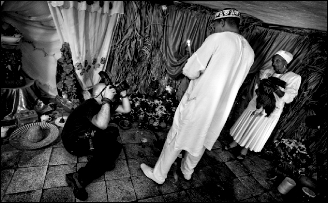 | 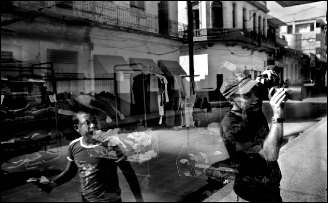 | ||
| |||
| |||
| |
"The workshop was as educational as it was challenging, particularly in the face of a difficult environment for finding and shooting stories. It was exactly what I needed and clearly had a positive effect on the quality of my work in a short period of time. 100% recommended. The workshop would include a review of each day’s shooting, lessons on camera technique, style, and what I’m calling “social engineering” (how to work with people to tell their stories). We also delved into philosophy, ethics, and respect: cornerstones of photojournalism. I would absolutely recommend a workshop with Zoriah. The workshop was the most rewarding experience I’d had and justified not attending school. Fundamentally, I learned how to enter a country and be able to leave it with a story no matter what and I could not have learned how in a school. Given the situation, we drew on Zoriah’s experiences to cope and he had plenty. He was available 24/7 once in country, is a natural teacher, was focused on making me a better me rather than a Zoriah-clone, was vastly experienced, and a really nice guy to boot. I came away with more confidence in my ability to find a story, engage with subjects, shoot, and process. Overall, the quality of my work improved noticeably over the ten day workshop." Michael Weinhardt | |
| |
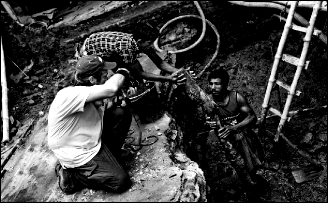 | 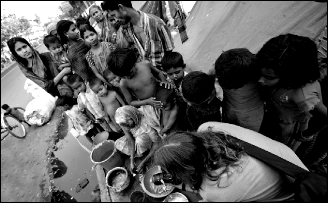 | ||
|
| ||
Dhaka, Bangladesh was home to this seven day workshop with student Earl Baumgardner. Earl entered the workhsop with several years of media experience covering disasters around the world including Hurricane Katrina, Jamaica and the Earthquake in Port au Prince, Haiti. Earl's goals were to further his work in the field of humanitarian photography and multi-media production. The workshop began with an in-depth review of the images Earl captured the week before in the aftermath of the earthquake in Haiti. Subjects such as visual storytelling, editing technique, organization were covered in depth. There was a focus on how to work with clients such as aid organizations, charities and other humanitarian groups and make that work a viable income. From approaching a new client to providing a quality final product for the organization that will help them with their goals and missions, all aspects of the business side of humanitarian photojournalism were covered. The workshop was a mix of shooting in the field and editing, portfolio and website building and business practices. While shooting in the field Zoriah and Earl documented a make-shift village where homeless Bangladeshi's had been living for over 25 years. The photographed life in this streetside village from the young children to the most elderly residents. In field shooting also focused on life in Old Dhaka and the workers wich make this industrial area a visually stimulating place to shoot. From hard labor to small shops and open-air markets, Earl and Zoriah captured a wide variety of images and completed many photographic exercises and "mini assignments" in order to further hone Earls skills shooting and working in the business of photojournalism. | |
| |
| |
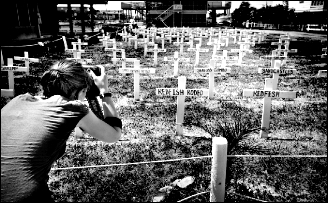 | 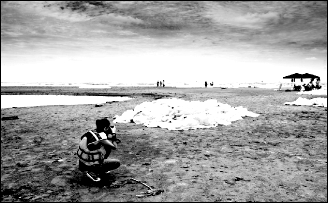 | ||
|
| ||
| |
"Zoriah has managed to find an original and artistic way to bring light to important issues. I have been following his work for years and he has continuously and consistently produced images that strike and inspire. Working along side Zoriah has been a truly memorable experience." Tina Checkie | |
| |
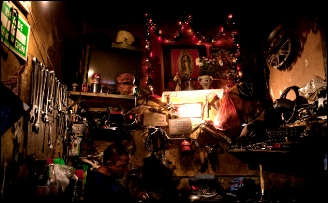 | 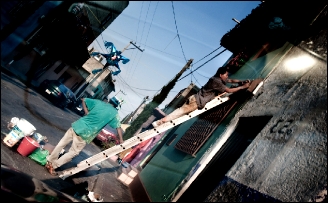 | ||
|
| ||
| |
"I decided on investing in a workshop with Zoriah because, aside from the fact that he carries a wealth of experience, knowledge and success, I greatly respect his sincerity and determination to make an impact not just as a photographer but as a storyteller, an artist and a humanitarian. I'm impressed with how he utilizes new web technologies successfully for his independent work. It enables him to reach people with stories that, as he reminds us, aren't necessarily the ones the commercial media care to tell. I decided clearly it will be far more valuable to take Zoriah's workshop than spend more money on equipment or travel. And I was right, he cleared up all the uncertainty I had in how, or even if to move forward, saved me money and stress with his practical approach to things, and in four days I improved my storytelling, editing skills, business sense and confidence level tenfold. Our first conversation touched on a big issue for me. "How do I get close to people and take their photos without feeling like I'm exploiting or disrespecting them...I'm thinking of getting the 70-200 again (which I'd sold to move to Mexico City) but really don't want to walk around the streets here with a big lens either...I didn't think I should need it". Zoriah's response was simply, "I'll probably convince you you can save your money". Two days later I was walking around a slum area in Mexico City with my 17-55 finding myself invited into people's crumbling and crowded homes. In a short time I was visiting with an elderly woman in her borrowed little rooftop shack she calls home. Later I thought if I'd had the bigger lens I'd either never have used it, or I'd have missed out on getting close to this woman and having a conversation that gave me far more insight into life in that area then any zoom lens could. For me stories depend not on what I see or think but on what I learn from other people. It's their stories I want to tell, not mine. This experience reminded me that not only is it possible to get close without the big lens, it feels more respectful and it's more my style. I also really appreciated Zoriah's confidence in my own abilities and artistic sense. He never tried to tell me exactly how to do something, just encouraged me to do what I believe in while sharing his thoughts and ideas for me. An annoying insecurity I had which he nicely put to rest was the fact that creativity and artistic expression were not something to shy away from in telling an honest story. I questioned and hesitated over that too much before and it held me back. I took a pretty big personal risk when I decided to quit commercial work and go this new direction. I took the first step simply on the belief that it was right for me. It hasn't been easy and as inspired as I get, I feel equally discouraged at times. I know in my case spending the time learning on my own, and having first pushed myself though some tough emotions and first projects made Zoriah's workshop all the more meaningful and beneficial. It was a real world challenge that pushed me further both personally and professionally. I never believed this path I chose would be easy and Zoriah confirmed that it never will be, but he also confirmed for me how important it is to me to continue." Shawna Nelles | |
